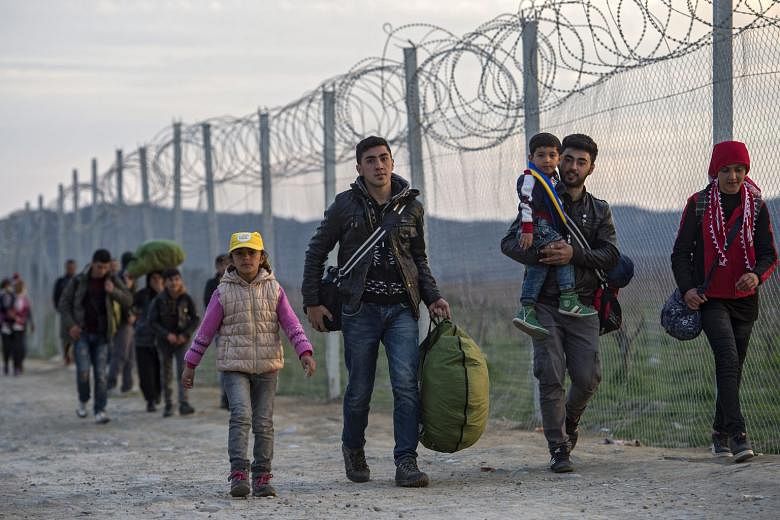I worry about the world's turbulent geopolitical condition. I find that much of the business world I come across also worry but almost invariably about their own condition and prospects - profits, market share, competitiveness - but not about the condition of the world. That they do not worry leads, among other things, to political inaction. We live in extremely dangerous times.
Having been on this planet for seven decades, I am aware that there were also great perils in the past, even the threat of nuclear annihilation during the Cold War. What would have happened if during the 1962 Cuban missile crisis, Moscow had called John F. Kennedy's bluff? There were also more wars then than now, notably the Vietnam War.
The difference is that during the Cold War era, as terrible as the threats were, they took place within a familiar arena with familiar actors. Partly for that reason, we were able to laugh, as in the hilarious 1964 film, Dr Strangelove Or How I Learned To Stop Worrying And Love The Bomb and another comedy in 1966, The Russians Are Coming! The Russians Are Coming!
I am not aware of any comedy that has been made on the themes of the Islamic State in Iraq and Syria (ISIS) or the confrontations in the South China Sea. Today, the arena is totally unfamiliar and the actors unknown and, hence, wildly unpredictable. The planet has undergone a number of quite radical simultaneous discontinuities since the fall of the Berlin Wall in 1989. China has surged as the new huge kid on the global block. The regimes in the Middle East have been and continue to be shaken to the point of implosion; the new technologies provide new forms of battlefields - cyber-attacks, a word coined only a few years ago - the proliferation of non-state actors such as Boko Haram, the conflicts between ethnicities and dogmas, and so on.
Thus, whereas most reasonably well-educated people could articulate the main ideological differences between communism and democracy, how many even highly-educated people can explain the theological differences between Sunnis and Shi'ites? At the risk of making an appalling metaphor, confusion reigns all the more today as the United States, the global hegemon, seems to be toying with a "Trump card".
This global geopolitical chaos is occurring at the same time as what can be described as a breakdown in global governance. None of the institutions that are meant to provide world order are functioning properly. The G20 has degenerated into a photo-op fest. Most blatant of all is the collapse of the WTO Doha Round. There is a solid consensus among policy-thinkers that a main cause of the failure of the Doha Round was a lack of business support and indeed interest. Business leaders complained that the discussions and issues were too complex and the process too slow. For that reason, many businesses have rushed to support the much simpler, neater and exclusive mega-trade deals such as TTIP (Trans-Atlantic Trade and Investment Partnership) and TPP (Trans-Pacific Partnership). Unfamiliarity breeds suspicion, so let's focus on what and whom we know, seems to be the thinking.

The subject of geopolitics tends to be eschewed in business schools and business forums not only because it is too confusing and complex - how can you extract three key learning points from the highly confusing confrontations in the South China Sea? - but also, as I have been occasionally told, because perspectives are too often too pessimistic. At a recent session on global geopolitical perspectives, a business executive claimed I was being far too pessimistic and that he in contrast was greatly optimistic. Where was this person from? Saudi Arabia!
In the face of these confusing and complex challenges, the position adopted by far too many businesses and business organisations has been that of the ostrich: Don't look, don't want to know, don't engage!
The geopolitical void created by the absence of business engagement has been filled with sundry groups and political parties that are causing disruption and fragmentation of the global market and the global community. The failure of business to engage on the issue of the recent surges in Europe of migrants and refugees has greatly aggravated the situation and given scope for extremist and racist groups to grow. The failure of business to stand up for a rules-based multilateral trade regime has led, inevitably, to the rise of protectionist forces.
In 1910, the influential author Norman Angell wrote: "International finance is now so interdependent and tied to trade and industry, that political and military power can in reality do nothing". Four years later, the shots in the streets of Sarajevo ushered in the carnage of a dreadful war the consequences of which lasted decades.
In 1919, the International Chamber of Commerce was established by a group of idealistic business leaders who referred to themselves as "merchants of peace". In the course of the Roaring Twenties, business leaders forgot the lessons of 1914-18, and then the world plunged into the inferno of the 1930s.
Business executives today should not only study geopolitics, but also, and perhaps especially, history. As the Spanish-American philosopher George Santayana said, "Those who do not remember the past are condemned to repeat it".
- The writer is emeritus professor of international political economy at IMD, Lausanne, Switzerland, and visiting professor at Hong Kong University. He is founder of The Evian Group, which promotes the development of open, sustainable, global market economies within a rules-based multilateral framework.


